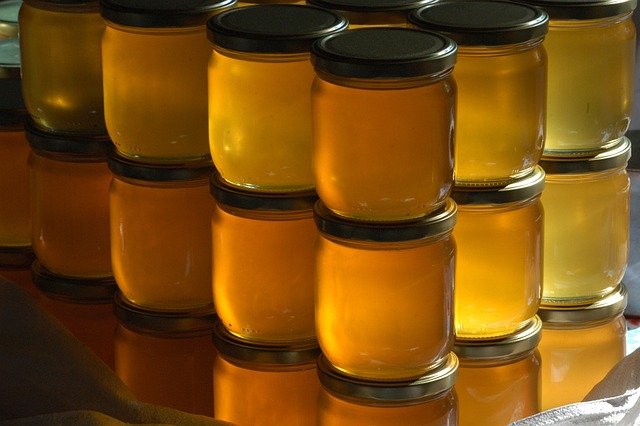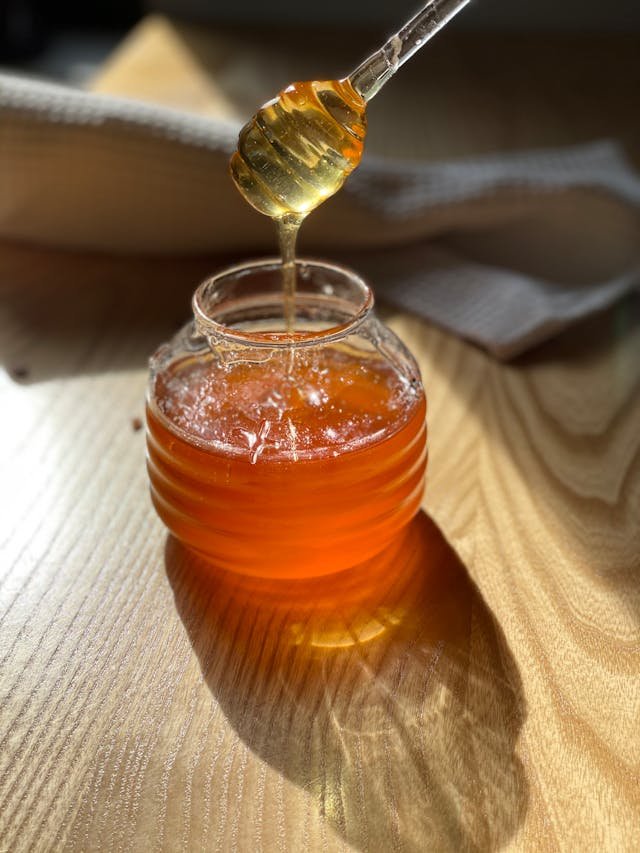Have you ever tried thyme honey? It’s a special kind of honey made from thyme plants, and it’s packed with flavor and health benefits. Thyme honey comes from various types of thyme, including Wild Thyme, Garden Thyme, and Mother-of-Thyme. This honey is part of the mint family, which also gives us tasty herbs like mint, sage, oregano, and lavender. Whether you’re a honey lover or just curious about new flavors, thyme honey is a sweet treat you won’t want to miss.

Where Does Thyme Honey Come From?
Thyme honey is a unique and flavorful type of honey made by bees that collect nectar from the flowers of thyme plants. Many thyme species exist. The most common sources for honey are Wild Thyme, Garden Thyme, and Mother-of-Thyme. Their scientific names are Thymus capitatus, Thymus vulgaris, and Thymus serpyllum. These thyme plants belong to the Lamiaceae family, including other aromatic herbs like mint, sage, oregano, and lavender.Thyme honey has a rich history and is mostly produced in the Mediterranean region. The unique climate and diverse flora here create perfect conditions for thyme. This allows thyme plants to thrive and produces exceptional honey. Let’s explore some of the key regions where thyme honey is made.
The Unique Flavors and History of Thyme Honey

One of the things that make thyme honey so special is its strong aroma and flavor. When you open a jar of thyme honey, you’re greeted with a burst of floral, spicy, and herbal scents. Some say it smells like burnt plastic or pencil drawings. It sounds strange, but it’s part of thyme honey’s unique charm. The taste is equally complex, with herbal, savory notes and a hint of tropical fruit and spice. It’s a flavor that stays with you, making each spoonful a delightful experience.
Thyme honey has been cherished for centuries. The Roman author Pliny the Elder praised thyme honey in his writings from about AD 77-79. He called it the best and most pleasant honey. The famous Greek physician Hippocrates believed in the healing powers of thyme honey. He wrote that it could clean sores, heal ulcers, and help with wounds. Even Aristotle, the Greek philosopher, recommended white thyme honey for sore eyes. These ancient endorsements show just how special thyme honey has always been.
Health Benefits of Thyme Honey

Thyme honey isn’t just delicious; it also offers a range of health benefits. For centuries, it has been used in traditional medicine for its healing properties. Let’s dive into some of the key health benefits of thyme honey and why it’s considered a superfood.
1. Antibacterial Properties
Thyme honey has powerful antibacterial properties. Thymol and carvacrol are natural compounds in thyme plants. They are largely responsible for this. These compounds are effective at killing harmful bacteria and preventing infections. Thyme honey can be applied to cuts, wounds, and burns. It helps prevent infection and promotes healing. It can also be taken by mouth to fight bacterial infections. So, it is a natural remedy for sore throats and respiratory infections.
2. Antioxidant Rich
Thyme honey is rich in antioxidants. They protect your body from free radicals. Free radicals are unstable molecules. They can damage cells and contribute to aging and diseases, like cancer. Thyme honey’s antioxidants help neutralize free radicals. They reduce oxidative stress and support health. Eating thyme honey can boost your immune system. It helps your body fight off illnesses better.
3. Anti-Inflammatory Effects
Inflammation is the body’s response to injury or infection. But, chronic inflammation can cause health problems, like heart disease and arthritis. Thyme honey has anti-inflammatory properties that can help reduce inflammation in the body. Regularly eating thyme honey can reduce inflammation and boost health. It can also be used topically to reduce inflammation and soothe irritated skin.
4. Soothes Sore Throats and Coughs
One of the most well-known benefits of thyme honey is its ability to soothe sore throats and coughs. Its antibacterial properties fight the bacteria that cause throat infections. Its thick, viscous texture coats the throat, providing comfort from irritation. Mixing a spoonful of thyme honey with warm water or tea can soothe a sore throat and reduce coughing. This natural remedy is particularly popular during cold and flu season.
5. Promotes Digestive Health
Thyme honey can also promote digestive health. It has treated digestive issues, like indigestion, bloating, and ulcers. Thyme honey has antibacterial properties. They help balance the gut microbiome. The honey reduces harmful bacteria and promotes beneficial ones. This can lead to improved digestion and improve overall health. Additionally, thyme honey’s natural enzymes can aid in the digestion process.
6. Boosts Immune System
Regular consumption of thyme honey can help boost your immune system. Thyme honey’s antioxidants, vitamins, and minerals boost your immune system. They help your body fight germs and illnesses. Eating thyme honey can boost your immune system. This is important when you’re more prone to illness.
7. Skin Health
Thyme honey is good for the skin. It has antibacterial and anti-inflammatory properties. It can be used as a natural treatment for acne, eczema, and other skin conditions. Thyme honey can reduce skin redness, swelling, and irritation. It also promotes healing. Its moisturizing properties make it a great remedy for dry, chapped skin. Use thyme honey as a face mask or spot treatment. Or, add it to your skincare routine. It will give you a healthy, glowing complexion.
8. Rich in Nutrients
Thyme honey is not just a sweet treat; it’s also rich in essential nutrients. It has vitamins, like vitamin C, B6, and folate. It also has minerals, like calcium, iron, magnesium, and potassium. These nutrients support many body functions. They are vital for bone health, muscle function, and energy production. Adding thyme honey to your diet can help ensure you get these essential nutrients.
9. Natural Energy Boost
Thyme honey boosts energy. Its natural sugars are quickly absorbed, providing a fast energy source. Unlike refined sugars, thyme honey also contains beneficial nutrients that support overall health. A spoonful of thyme honey before a workout or busy day can boost your energy and endurance.
10. Aids in Weight Management
Honey has natural sugars. In moderation, it can help with weight management. Thyme honey has a lower glycemic index than refined sugars. So, it does not cause a rapid spike in blood sugar. This helps prevent cravings and overeating. Also, thyme honey’s natural sweetness can satisfy your sweet tooth. It may reduce your craving for unhealthy snacks. Thyme honey can help with weight management and health if used in a balanced diet.
Tips for Choosing and Using Thyme Honey
When shopping for thyme honey, it’s important to look for high-quality, pure honey to ensure you get the maximum health benefits. Here are some tips for choosing and using thyme honey:
- Look for Raw Honey: Raw thyme honey is unprocessed. It has more nutrients and benefits than pasteurized honey. Raw honey is often labeled as “unfiltered” or “unpasteurized.”
- Check the Source: Choose honey from trusted beekeepers or regions known for high-quality thyme honey, like Greece or New Zealand.
- Read the Label: Ensure the honey is 100% pure thyme honey, with no added sugars or other ingredients. Some honey products may be labeled as “thyme-flavored” but are not pure thyme honey.
- Store Properly: Keep your thyme honey in a cool, dark place to preserve its quality. Do not store honey in direct sunlight or a hot place. It can degrade its beneficial properties.
- Use in Moderation: Thyme honey has health benefits but is high in natural sugars. Use it in the modern day as part of a balanced diet.
Culinary Uses
Thyme honey is a versatile ingredient that can be used in a variety of culinary applications. Here are some ideas for incorporating thyme honey into your meals and snacks:
- Drizzle Over Yogurt: Add a spoonful of thyme honey to your yogurt for a sweet and flavorful boost. This is a traditional way to enjoy honey in Greece.
- Sweeten Tea: Use thyme honey to sweeten your herbal teas or other hot beverages. It adds a unique flavor and enhances the health benefits of your tea.
- Snacks: Thyme honey on whole-grain toast makes a tasty, healthy snack.
- Salad Dressings: For a tasty dressing, mix thyme honey with olive oil, lemon juice, and mustard.
- Marinades: Use thyme honey in marinades for meats, poultry, or vegetables. Its sweet and savory flavor pairs well with a variety of dishes.
- Baking: Add thyme honey to your cakes, cookies, and muffins. It is a natural sweetener with a unique flavor.
- Cheese Pairing: Pair thyme honey with goat cheese or aged cheddar. It’s a delightful flavor combination.
Conclusion
Thyme honey is a remarkable type of honey. It has a unique flavor and many health benefits. Thyme honey is a cherished natural product. Its rich history, traditional uses, and modern uses in cuisine and medicine make it so. Choose high-quality thyme honey. Add it to your diet and routine. You will enjoy its taste and health benefits. Thyme honey is a sweet, versatile addition to your life. Use it to soothe a sore throat, drizzle it over yogurt, or add it to your skincare routine.



